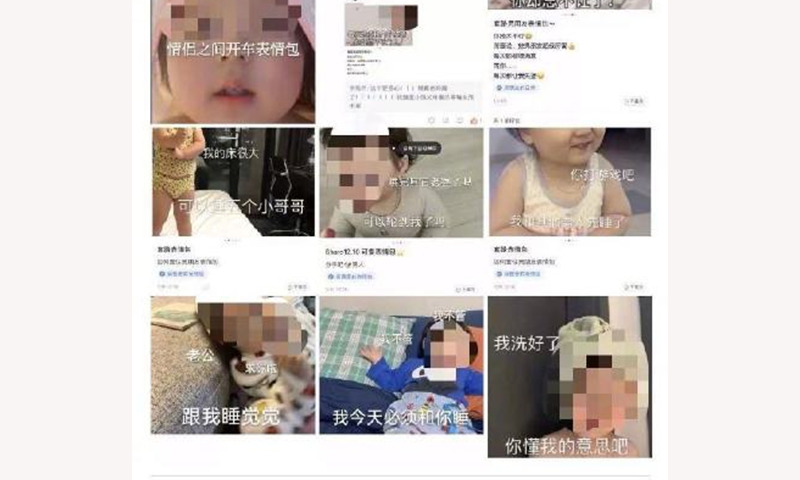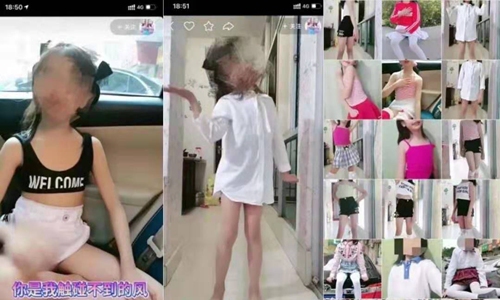
Emotes featuring images of children Photo: Sina Weibo
The sale of digital emotes featuring images of children alongside sexually explicit words has evoked the anger of Chinese netizens, while Chinese experts have weighed in saying that both merchants and online platforms selling these emotes have violated the law.
Emotes are extremely popular on Chinese social media, to include those featuring memes involving cute kids or popular celebrities such as child stars from South Korea. However the offending emotes, sometimes referred to as "flirting routines," take these innocent images and give them a sinister bent by adding sexually suggestive words to these children's innocent smiles and cute faces.
A quick review of WeChat shows that many micro WeChat merchants are selling these types of emote packs. Users who wish to purchase a full set of meme emotes must first give a like or follow the account.
Meanwhile, a variety of these "cute kids" meme packs can also be purchased at various prices on some e-commerce platforms. One South Korean child star's emoticon pack has become a packaged product selling for 1.49 yuan (23 cents) for 100 emotes or 6.88 yuan for 520 in one shop whose sales reach more than 100 such packs a month.
The hashtag "Children's pornographic emotes are difficult to delete" has gone trending on Sina Weibo, with many Chinese netizens expressing anger at these merchants and platforms.
"Don't you think you have some moral problems by taking children's photos to make these vulgar things? The widespread of these memes online might create more pedophiles and rapists," one Chinese netizen commented on Sina Weibo.
"Would you like your child to be portrayed like this? I have reported this to the WeChat team hundreds of times. I hope this time I can succeed," another netizen wrote.
Shen Binti, a lawyer based in Beijing, told the Global Times on Wednesday that these emotes not only violate the image rights of these children, but also constitute an insult to the children that lowers their social evaluation and degrades their reputation.
"If the e-commerce platform does not remove these links, they may not only face civil claims, but also administrative penalties," Shen added.
However, according to a report from Guangming Online, these merchants say that they collected the photos online and so their actions do not constitute infringement of anyone's image rights.
Zhao Hui, a lawyer with the Beijing Youth Legal Aid and Research Center, also told the Global Times on Wednesday that without the consent of the minor's guardian, other persons cannot use nor publish their photos without authorization.
"Additionally, adding vulgar content to emotes featuring children for commercial sale is illegal, and in serious circumstances may constitute a crime," said Zhao.
Both lawyers quoted article 80 of the new revised Law on the Protection of Minors, which states that when network service providers find that users are publishing or disseminating information that contains content that endangers the physical or mental health of minors, they should immediately stop transmitting the relevant information, take measures to remove it, keep relevant records, and report the content to the authorities such as Internet Information and Public Security Bureau.
If anyone refuses to take corrective action or in cases where the circumstances are serious, relevant authorities may suspend the relevant business for rectification, close their website, revoke their business license, or revoke all relevant permits.
Global Times


